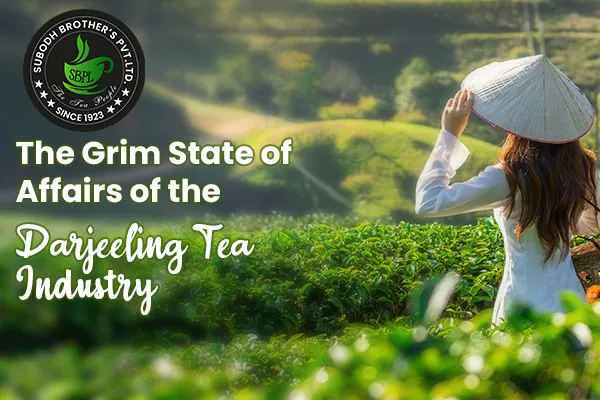The Uncertain Future Of Darjeeling's Tea Industry

Table of Contents
Climate Change and its Impact on Darjeeling Tea Production
The fragile ecosystem of Darjeeling, crucial for producing high-quality tea, is highly vulnerable to climate change. The delicate balance of temperature and rainfall is essential for the tea plant's growth and the development of its distinctive flavor profile.
Shifting Rainfall Patterns and Temperature Fluctuations
Unpredictable weather patterns are significantly impacting Darjeeling tea yields.
- Increased frequency of droughts: Prolonged dry spells lead to wilting plants, reduced leaf production, and a diminished harvest.
- More frequent and intense floods: These catastrophic events damage tea bushes and wash away fertile topsoil, impacting future harvests.
- Erratic temperatures: Fluctuations in temperature disrupt the delicate flowering and budding cycles of the tea plants, negatively affecting both quantity and quality.
Studies have shown a notable reduction in Darjeeling tea yields in recent years, directly correlated with increasingly erratic weather patterns. This unpredictability also affects the distinctive muscatel flavor, a key characteristic of Darjeeling tea, making it less consistent and potentially diminishing its value.
Pest and Disease Infestation
Changing climatic conditions create a breeding ground for pests and diseases, further stressing the already vulnerable tea plants.
- Increased vulnerability: Warmer temperatures and higher humidity favor the proliferation of various pests and fungal diseases.
- Pesticide use: The increased need for pest control leads to higher pesticide use, raising concerns about environmental impact and the potential for residue in the final product.
- Organic farming: Transitioning to organic farming practices is crucial to mitigate these risks and protect both the environment and the health of consumers. However, this shift requires substantial investment and technical expertise.
- Government initiatives: Research into developing climate-resilient tea varieties and providing support for sustainable agricultural practices is vital for the long-term health of the Darjeeling tea industry.
Labor Shortages and the Aging Workforce
The Darjeeling tea industry is also facing a severe labor shortage, largely due to an aging workforce and the migration of young people to urban areas.
Migration of Young People to Urban Areas
Young people are increasingly leaving tea gardens in search of better opportunities in urban centers.
- Lack of attractive employment: The tea industry often offers low wages and challenging working conditions, making it less appealing to the younger generation.
- Limited career prospects: The lack of career progression within the tea industry further discourages young people from pursuing careers in tea cultivation.
- Attracting a new generation: Revitalizing the industry requires substantial efforts to make tea cultivation a more attractive and viable career path for young people. This includes improving wages, working conditions, and offering opportunities for skill development and career advancement.
Wage Issues and Working Conditions
Fair wages and improved working conditions are paramount for attracting and retaining a skilled workforce.
- Wage disparities: Addressing wage disparities and ensuring fair compensation is essential to improve worker morale and prevent further migration.
- Working conditions: Improving working conditions, including providing access to better housing, healthcare, and education, will attract and retain workers.
- Worker empowerment: Initiatives to empower workers and provide them with a voice in decision-making processes can lead to greater job satisfaction and retention.
Evolving Consumer Preferences and Market Competition
The Darjeeling tea industry faces stiff competition in a rapidly changing global market. Consumer preferences are shifting, and new tea varieties and beverages are emerging.
Changing Tea Consumption Habits
Consumer habits are evolving, impacting the demand for Darjeeling tea.
- Shifting preferences: Consumers are exploring a wider range of beverages, including specialty coffees and other types of tea.
- Convenience: The rise of ready-to-drink beverages and single-serve tea options presents a challenge to traditional Darjeeling tea consumption.
- Health consciousness: Growing awareness of health and wellness is influencing consumer choices, with some opting for herbal teas or other beverages perceived as healthier.
Global Competition and Pricing
Darjeeling tea faces intense competition from other tea-producing regions.
- Lower-priced alternatives: Lower-priced teas from other regions present a challenge to maintaining competitive pricing for Darjeeling tea.
- Differentiation: Highlighting the unique qualities and superior taste of Darjeeling tea is crucial to maintaining its premium position in the market.
- Branding and marketing: Investing in effective branding and marketing strategies is essential to attract and retain consumers in a competitive market.
Economic Challenges and Sustainability Initiatives
The economic viability of small tea farms is crucial for the survival of the Darjeeling tea industry. Sustainable practices are essential for the long-term health of the industry and the environment.
Economic Viability of Small Tea Farms
Many small tea farmers are struggling to maintain profitability.
- Financial difficulties: Many small-scale tea farmers face significant financial challenges due to low yields, high production costs, and fluctuating market prices.
- Government support: Government support programs, including financial assistance, training, and access to credit, are vital for ensuring the economic viability of small tea farms.
- Cooperative models: Cooperative farming models can help small farmers access resources, negotiate better prices, and improve their overall economic situation.
Sustainable Practices for Long-Term Growth
Sustainable practices are essential for the long-term health of the Darjeeling tea industry and the environment.
- Organic farming: Promoting organic farming practices helps minimize environmental impact and enhances the quality and value of Darjeeling tea.
- Fair trade certifications: Obtaining fair trade certifications can improve the livelihoods of tea workers and ensure ethical sourcing.
- Responsible tourism: Promoting responsible tourism can generate additional income for the community while preserving the environment and cultural heritage.
Conclusion
The future of the Darjeeling tea industry is inextricably linked to addressing the complex challenges it faces. Climate change, labor shortages, evolving consumer preferences, and economic pressures all contribute to an uncertain outlook. However, by embracing sustainable farming practices, improving worker conditions, implementing effective marketing strategies, and securing government support, the Darjeeling tea industry can navigate these challenges and secure a brighter future. Investing in the future of Darjeeling tea production is not merely an economic imperative; it is a vital step in preserving a unique cultural heritage and ensuring the continued enjoyment of this world-renowned beverage. Let's work together to safeguard the Darjeeling tea industry and its invaluable contribution to the world of tea.

Featured Posts
-
 Nhl Standings Crucial Friday Matches And Playoff Scenarios
May 04, 2025
Nhl Standings Crucial Friday Matches And Playoff Scenarios
May 04, 2025 -
 Ufc Des Moines Fight Night Predictions And Betting Odds
May 04, 2025
Ufc Des Moines Fight Night Predictions And Betting Odds
May 04, 2025 -
 Blake Lively And Anna Kendrick Reunite Putting Feud Rumors To Rest At Premiere
May 04, 2025
Blake Lively And Anna Kendrick Reunite Putting Feud Rumors To Rest At Premiere
May 04, 2025 -
 4 G Wh Bess Project In Netherlands Lion Storage Announces Financial Close
May 04, 2025
4 G Wh Bess Project In Netherlands Lion Storage Announces Financial Close
May 04, 2025 -
 Logan County Jail Report Inmate Information And Bookings
May 04, 2025
Logan County Jail Report Inmate Information And Bookings
May 04, 2025
